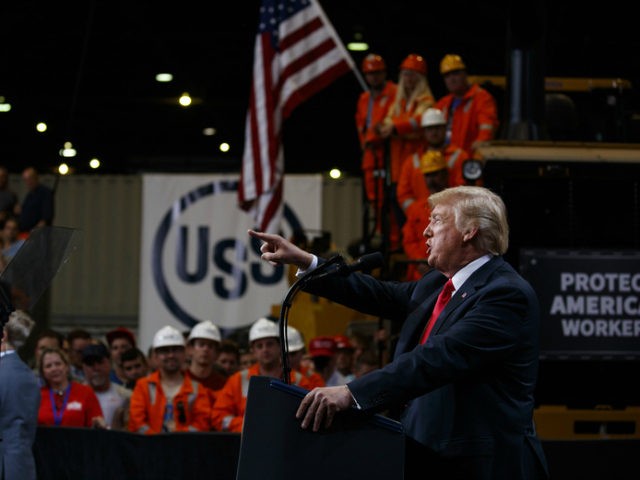The United States has agreed to remove steel and aluminum tariffs on Canada, President Donald Trump said on Friday.
Canada has also agreed to drop the tariffs it raised on goods imported from the U.S. in retaliation.
The two countries issued a joint statement on Friday confirming that they had agreed to eliminate the tariffs within 48 hours.
Several reports citing unnamed sources in the U.S. and Canada say the Trump administration also has reached a deal to remove metals tariffs from Mexico.
President Trump put a 25 percent tariff on imported steel and a 10 percent tariff on imported aluminum last year after a Commerce Department study found a surge of imports was a danger to national security. China, although not a significant exporter of steel to the U.S., had depressed global steel prices by dumping its excess metals production on the global market. Trump administration officials have also said that some Chinese steel was making its way into the U.S. market after being diverted through other countries, a process known as transshipment.
Canada and Mexico reacted to the steel tariffs by imposing tariffs on U.S. farming products and other goods. Although the three nations agreed last year to a new trade deal to replace Nafta, the metals and retaliatory tariffs remained in place.
Under the terms of the agreement announced Friday, the U.S. will be able to revive the tariffs on metals if imports surge beyond historical levels, often a signal that transhipping is occuring. As part of the crackdown on transhipments, the two countries also agreed to implement measures to trace the origins of steel and aluminum that enter the North American market.
Here’s the Joint Statement::
After extensive discussions on trade in steel and aluminum covered by the action taken pursuant to Section 232 of the Trade Expansion Act of 1962 (19 U.S.C. §1862), the United States and Canada have reached an understanding as follows:
1. The United States and Canada agree to eliminate, no later than two days from the issuance of this statement:a. All tariffs the United States imposed under Section 232 on imports of aluminum and steel products from Canada; and
b. All tariffs Canada imposed in retaliation for the Section 232 action taken by the United States (identified in Customs Notice 18-08 Surtaxes Imposed on Certain Products Originating in the United States, issued by the Canada Border Services Agency on June 29, 2018 and revised on July 11, 2018).
2. The United States and Canada agree to terminate all pending litigation between them in the World Trade Organization regarding the Section 232 action.
3. The United States and Canada will implement effective measures to:
a. Prevent the importation of aluminum and steel that is unfairly subsidized and/or sold at dumped prices; and
b. Prevent the transshipment of aluminum and steel made outside of Canada or the United States to the other country. Canada and the United States will consult together on these measures.
4. The United States and Canada will establish an agreed-upon process for monitoring aluminum and steel trade between them. In monitoring for surges, either country may treat products made with steel that is melted and poured in North America separately from products that are not.
5. In the event that imports of aluminum or steel products surge meaningfully beyond historic volumes of trade over a period of time, with consideration of market share, the importing country may request consultations with the exporting country. After such consultations, the importing party may impose duties of 25 percent for steel and 10 percent for aluminum in respect to the individual product(s) where the surge took place (on the basis of the individual product categories set forth in the attached chart). If the importing party takes such action, the exporting country agrees to retaliate only in the affected sector (i.e., aluminum and aluminum-containing products or steel).

COMMENTS
Please let us know if you're having issues with commenting.